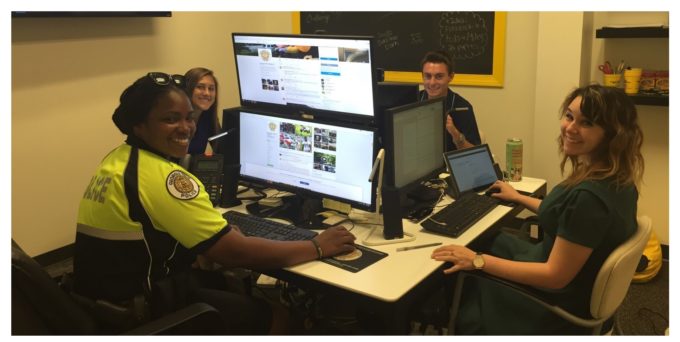A New Platform for Community Engagement and Neighbourhood Watch in the 21st Century
Summary:
The New South Wales Police Force’s , (Australia) eyewatch program brings the community and police together to communicate and solve problems, using Social Media – facebook. The NSWPF has two strategies:
- Local Community policing information via 91 local and specialized facebook pages.
- The reinvigoration of its Neighbourhood Watch program thorugh the use of Closed and Secret Facebook groups (90 groups established as at 24th of April 2012)
The New South Wales Force, Australia, (NSWPF) has nearly 16,000 sworn officers serving a population of seven million in the state of New South Wales, Australia. The NSWPF’s jurisdiction spans an area of approximately 310,000 square miles.
In 2010, a team was created to assess the feasibility of taking the traditional neighborhood watch groups into online forum using social media. By early 2011 an implementation plan was developed and project eyewatch was born.
Project eyewatch represents the NSW Police Force’s response on behalf of the Government of NSW commensurate to the reinvigoration of the concept of Neigbourhood Watch in the 21st Century.
Active Neighbourhood Watch Groups mobilised through project eyewatch, using the social network tool facebook will be given opportunity to participate with their local Police in active crime prevention. Reducing crime through conscious security measures, visibility and community cohesion can often neutralise risks posed by those in the minority who seek to disrupt our lives.
It is envisaged that the community, have a wealth of knowledge about their own environs, are in the best position to consider law enforcement and local government strategies to reduce crime and the perception of crime. To assist this process it is considered that project “eyewatch” will operate around (4) key strategies;
STRATEGY 1 – We will focus on the people who need our help
With “eyewatch” and Local Police and Crime Management Units will develop a strong opportunity for community to participate in Policing – Our greatest asset is community information, which can be acted upon by Police who are adaptive and responsive.
STRATEGY 2 – We will empower accountability
Local Police using “eyewatch” will engage their community to participate in the decision making about policing their communities. They will be facilitated by trained coordinator’s and be supported by Police and Local Government coordination to ensure all opportunities for improvement to safety in communities are recognized.
STRATEGY 3 – We will balance priorities
Recognising our community, seeking engagement in achievements and developing issues is the best way to gain support for setting priority. Our strategies and success developed by Local Community and Government Teams will be marketed through “eyewatch”and via media outlets.
STRATEGY 4 – We will develop community capacity and sustainability
Local Police will work with their community precincts and actively recruit key community members to develop or enhance their capability and be measured on outcomes, where the need for improvement was identified. If required a higher level coordination and support will be provided to them by Crime Prevention Partnerships, Regional Interagency Teams and support services.
Community engagement is already part of the way in which police “do the business”. It is the involvement of the public both individually and through groups, committees and agencies in the decisions we make and the activities police undertake. “eyewatch” allows a greater flow of information via the social network phenomenon.
The program has seven main benefits: gives the community greater access to information, provides real-time engagement, seeks a consensus on problems, provides accurate and up-to-date information, facilitates forums to find solutions, creates an ability to provide feedback, and develops a high-value community network.
NSWPF’s eyewatch strategy incorporates not just Facebook pages, but also Facebook groups. The Facebook pages are used by the Local Area Commands to push out crime prevention messages, alerts, updates, and other pertinent community information. The Facebook groups provide a closed forum for discussion, essentially bringing traditional Neighborhood Watch Groups online. However, these online groups add a new element by giving the opportunity for a particular demographic to collaborate in environment with law enforcement. For example, groups have been created for the retail community, those from rural areas, and school administrators. In addition, NSWPF has created internal groups, such as a group for crime prevention officers. Because the agency spans such a large geographic area, the best place to come together is sometimes online, rather than in person, and the Facebook groups provide the opportunity for internal collaboration.
Using social media tools has allowed NSWPF to reach larger and more diverse audiences than ever before. The online forum serves as a place to get the conversation started, but the conversations do not stop there. People are sharing the information off line as well. There have been numerous success stories since the inception of the eyewatch program. One example: there has been a 20 percent increase in the information flow to the crime stoppers tip line.
When asked what advice he has for other law enforcement agencies looking to establish social media presences, Chief Inspector Maxwell’s first comment was “don’t be scared.” Social media is simple and can be used as a joint problem-solving tool, bringing the community and the police together.
As the NSWPF moves toward its 150th anniversary, they plan to establish an eyewatch presence for all their Local Area Commands. As the program becomes more mainstream in New South Wales, NSWPF hopes that the social media tools are used not just in emergencies and other specific circumstances, but in the “every day” policing that is so important to a community.
=============================================

Chief Inspector Josh Maxwell will deliver the opening keynote address at The SMILE Conference™ in Richmond, VA in September.
Maxwell has been a police officer in NSW for 22 years, with his career covering General Duties, Plainclothes and Investigations, Public Order and Firearms and Operational Safety Instructional duties. He has been involved in tactical, operational and strategic command of major incidents and police operations as well as education delivery, administration, human resource management and leadership. Chief Inspector Maxwell is currently the Project Manager for Project “eyewatch” – New South Wales Police Force.
Chief Inspector Maxwell has undertaken significant studies in the tertiary, vocational, law enforcement and emergency management sectors and holds a Master of Education (ACU), Graduate Diploma of Professional Leadership & Education (ACU), Graduate Certificate in Professional Development & Education, Bachelor of Policing (CSU) and an Associate Diploma of Policing (CSU).



